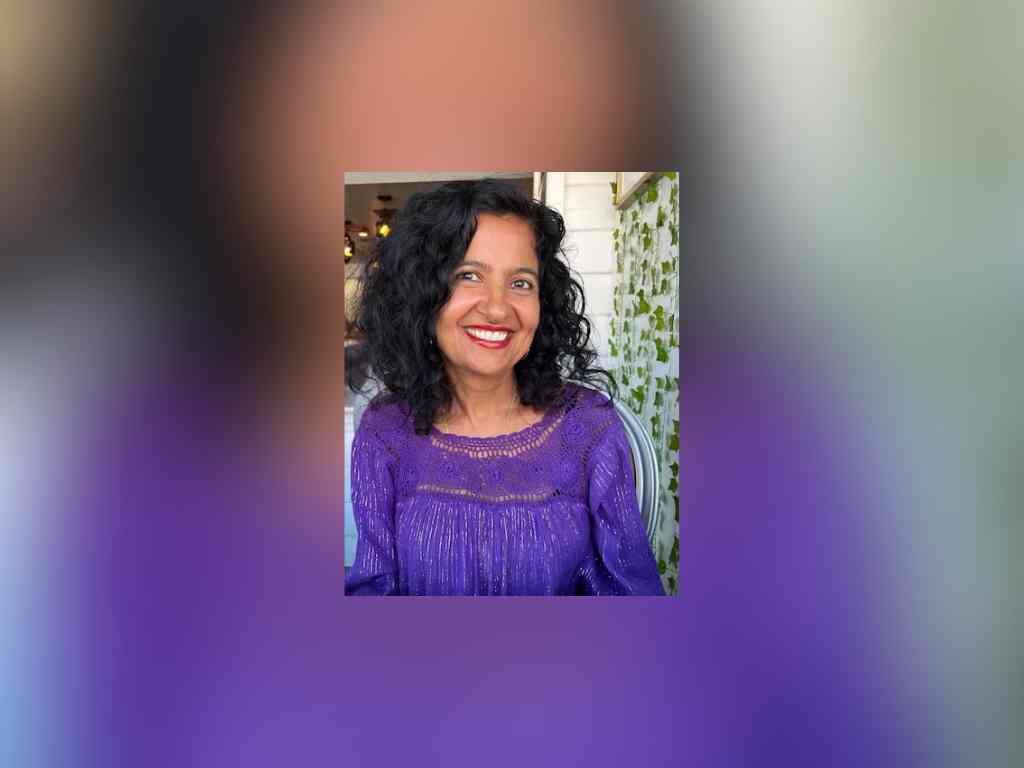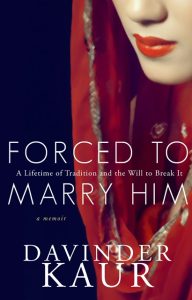Read Now: Davinder Kaur, forced marriage survivor, on breaking free and exposing abuse against women: “We all have to play our part in ending these human rights abuses.”

Published 2/28/2023
Davinder Kaur was born and raised in an Indian community in Bradford, England. At the age of 14, against her will but according to the traditions her family obeyed, she was engaged to a boy she had never met. When she refused to stay with him, her life was threatened. She now speaks up courageously against harmful traditional practices such as forced marriage and child marriage.
This is her story of being forced to marry an abusive man—and of how she found her freedom.
*The opinions of Davinder Kaur don’t necessarily reflect those of AHA Foundation*
I was born and raised in the United Kingdom, but my family is originally from the Punjab in India, and they carried over their traditions and practices when they came over. In their culture, arranged marriages were perfectly normal. When I was 14, I was shown a picture of a boy who lived in India and I was told that I was now engaged to him. I had no say in the matter, no control over my own future. If I had said no, I would have been slapped.
As I approached the age of 18, I realized that I had no desire to marry this boy I had never met. The marriage day was fast approaching, and I tried to get out of it by running away—only to be tricked into coming back. In the end, I couldn’t get out of it, and I was married to the boy in Denmark.
We were completely different. Despite my Indian heritage, I had grown up in Britain and was very westernized. He was raised in India and had very different cultural expectations of what marriage entailed. We had no chemistry and I soon found him to be very controlling. On our wedding night, we consummated the marriage, but I wish now that I hadn’t given in to those expectations. The cultural pressure is so strong, however, and I felt like I had no choice.

Davinder chose to speak up about her experiences to help other women facing similar injustice by writing a memoir.
But I had long known that I had no intention of staying in this marriage that was forced upon me. I knew that I had rights. I told my husband I didn’t want to be intimate with him again. Now that I was away from the watching eyes of my family, I could assert my rights. About two weeks into our marriage, I told him I wanted a divorce.
My husband called my father, who came to Denmark to try to convince me to stay. I stood my ground and told him I had never wanted this marriage, that my husband and I were just too different. My father got very angry and stormed off with my husband to go and drink.
My husband eventually returned, drunk, and I knew something terrible was about to happen when he turned the music on really loud and advanced towards me. He told me I’d been bad, and that if he couldn’t have me, nobody else could either. He put his hands around my neck and started to strangle me.
I knew I was going to die if I didn’t give in to him. So I pleaded with him and told him he was right, I had been a bad wife, that I would try harder with the marriage, that I was sorry. He forced himself on me after that, and I had to submit, because I knew my life was in danger.
When my father returned later on, I told him what had happened. I told him my husband had strangled me and raped me and that I needed my dad’s help. My father responded: “He had every right to do that to you—he’s your husband.” My own father wouldn’t help me. He was the one who had forced me into this marriage and now my marriage was an excuse for my husband to beat and rape me!
I felt truly alone in this strange country, married to a brute.
This was the breaking point. I knew I had to get away from both of these men—the abusive husband and the father who refused to protect his daughter.
That very evening, I took the biggest risk of my life. I fled the apartment, terrified of being caught. But I made it to a friend’s place and reported the incident to the police. Within days, I collected my belongings from the apartment, protected by work colleagues, and filed for divorce. The divorce took years to go through, but I never saw my husband—my abuser—again.
But my abuser eventually got what he wanted—British citizenship. This was the reason I had been married off to him in the first place, so that he could get into the UK. My family had treated me like a slave. I was used for my British citizenship, transported to another country to provide services to a thug. I had to be a good wife and cook and clean for him, like I had been brought up to do. My own needs and safety were tossed aside. I was not a human being to them, but an object.
Sadly, this is how many women are treated around the world, including in places like the UK and the U.S. All too often, women are treated as serfs, good for only childrearing and drudgery. All too often, we are seen as the property of men, rather than human beings.
“I managed to escape early on and am living my life to the full as a free woman… But many women are not so fortunate.”
I managed to escape early on and am living my life to the full as a free woman and the mother of three beautiful children. But many women are not so fortunate. Forced marriage is recognized as a form of human trafficking and a human rights abuse that must be stopped. No man has the right to rape a woman, whether he is married to her or not. No means no. If a man cannot respect that, he needs to be locked up.
The reality of such abuse is why I now use my voice to speak out. I now live in the U.S. and I try to raise awareness of issues such as forced and child marriage. I wrote a memoir about my experience, Forced to Marry Him: A Lifetime of Tradition and the Will to Break It, because I wanted to reclaim my story, face head-on the abuse I had been subjected to, and expose the harm that is done to women all over the world in the name of tradition.
I also give talks whenever I can. I only started speaking out in public about my own experience from 2019 and have now participated in about 15 events. I have organized at least three events myself. I’m extremely proud that I organized “United Against Harmful Practices” in June 2020 which featured not only myself but other survivors, such as Fraidy Reiss (founder of Unchained At Last), Sara Tasneem, Dawn Tyree, and Payzee Mahmod.
Watch: “United Against Harmful Practices”
We all have to play our part in ending these human rights abuses. Until we speak out, how will anyone know of the pain and suffering we have gone through? How can we bring about change without awareness?
On February 9, 2023, a bill to ban child marriage in California was introduced to the state’s Senate by Senator Aisha Wahab. This is the culmination of years of hard work by AHA Foundation and our allies. We reached out again to Davinder, who now lives in San Diego, for her reaction to this news. Here is what she had to say:
I am very excited to hear that SB 404 is waiting to be voted on. I have spoken up in favor of the bill by writing to various California legislators. This has been a long fight for me. Back in 2020, I spoke with Assembly Member Brian Maienschein’s staffer Rob Knudsen about my story, and he asked if there had been any previous legislation dealing with child marriage in California. We researched and discovered that a bill had been passed before, but it was inadequate as it contained exceptions.
Rob suggested I form alliances with others who wanted to end child marriage absolutely, so I reached out to various organizations, including Unchained At Last, the National Coalition to End Child Marriage, and the CA Coalition to End Child Marriage. I have spent a long time with allies trying to raise awareness of the issue and the need for such a bill, so I was happily surprised when I heard about this bill’s introduction—it is a reflection of so many peoples’ hard work in drawing attention to child marriage in California.
“We need to let kids be kids and end the cruel, harmful practice of child marriage. Let’s protect our kids and safeguard their futures.”
Now, we just need to get the bill over the finish line. I will continue to urge legislators to support this bill. California has to join the 7 other states that have ended child marriage with no exceptions. There are 43 states to go. That’s way too much and we have to work on getting this down to zero states as the entire country should ban child marriage. We need to let kids be kids and end the cruel, harmful practice of child marriage. Let’s protect our kids and safeguard their futures.
Visit Davinder’s Website
Follow Davinder on Instagram

